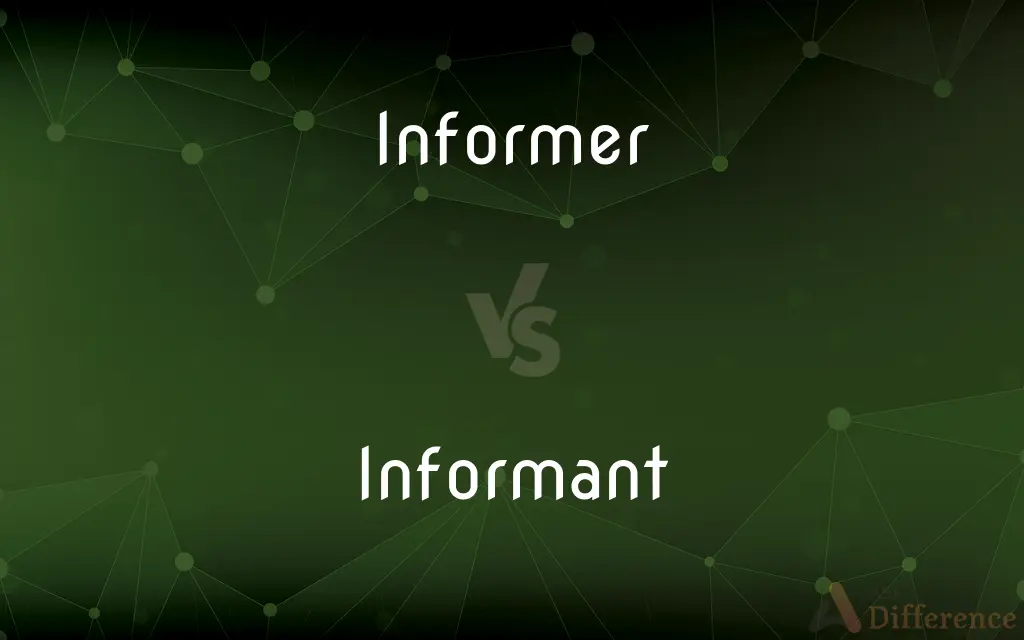Informer vs. Informant — What's the Difference?
By Urooj Arif & Maham Liaqat — Updated on March 22, 2024
Informer and informant both refer to individuals who provide information, but they differ in connotation and specific contexts of use.

Difference Between Informer and Informant
Table of Contents
ADVERTISEMENT
Key Differences
An informer is often associated with a negative connotation, suggesting betrayal or espionage, especially in informal or criminal contexts. An informant, while it can carry similar implications, is more neutral and is commonly used in legal and journalistic settings to denote a source of information.
Informers are typically associated with covert operations, espionage, and criminal underworlds, implying someone who secretly provides information to authorities or rival groups. Informants are used more broadly in legal, research, and journalistic fields, indicating someone who supplies information for investigations, studies, or news stories without the inherent negative connotation of secrecy or betrayal.
In legal and law enforcement contexts, the term informant is preferred and denotes someone who provides information about illegal activities, often from within an organization. This term is used officially in police reports and legal documents.
Informants, especially in legal contexts, are often provided with anonymity and protection due to the sensitive nature of the information they provide. Informers, given the more informal and sometimes pejorative use of the term, may not always receive the same level of protection or anonymity.
An informer might be seen as betraying their peer group, while an informant is generally considered to be aiding an investigation or research from a more neutral or cooperative standpoint.
ADVERTISEMENT
Comparison Chart
Connotation
Often negative, suggesting betrayal
More neutral, used in official contexts
Usage Context
Covert operations, espionage, criminal underworld
Legal, research, journalistic fields
Legal Settings
Less commonly used in official documents
Preferred term in legal and official documents
Anonymity and Protection
May not always be protected
Often provided with protection and anonymity
Relationship to Authority
Seen as betraying a peer group
Aiding an investigation or research, neutral stance
Compare with Definitions
Informer
An individual who secretly provides information about a group or activity, often seen as a traitor.
The gang was brought down with the help of an informer from within their ranks.
Informant
A source of information, particularly in legal, investigative, or journalistic contexts.
The police acted on a tip from a confidential informant.
Informer
Associated with espionage and secretive information gathering.
During the Cold War, informers played key roles in intelligence operations.
Informant
May be part of a witness protection program due to the risks involved.
The key informant in the case was given a new identity for safety.
Informer
Can imply someone acting out of personal interest or malice.
The informer tipped off the rivals for a share of the profits.
Informant
Often involved in providing information about criminal activities or research data.
The informant provided crucial data for the scientific study.
Informer
An informant, especially one who informs against others for compensation.
Informant
An informant (also called an informer) is a person who provides privileged information about a person or organization to an agency. The term is usually used within the law enforcement world, where they are officially known as confidential human source (CHS), or criminal informants (CI).
Informer
One who informs someone else about something.
Informant
A person who gives information to another.
Informer
A person who tells authorities about improper or illegal activity.
Informant
One that gives information.
Informer
One who informs, animates, or inspires.
Informant
One who informs against others; an informer.
Informer
One who informs, animates, or inspires.
Nature, informer of the poet's art.
Informant
One who furnishes linguistic or cultural information to a researcher.
Informer
One who informs, or imparts knowledge or news.
Informant
One who relays confidential information to someone, especially to the police; an informer.
Informer
One who informs a magistrate of violations of law; one who informs against another for violation of some law or penal statute.
Informant
(linguistics) A native speaker who acts as a linguistic reference for a language being studied. The informant demonstrates native pronunciation, provides grammaticality judgments regarding linguistic well-formedness, and may also explain cultural references and other important contextual information.
Informer
One who reveals confidential information in return for money
Informant
One who, or that which, informs, animates, or vivifies.
Informant
One who imparts information or instruction.
Informant
One who offers an accusation; an informer. See Informer.
It was the last evidence of the kind; the informantwas hanged.
Informant
A person who supplies information
Informant
Someone who sees an event and reports what happened
Common Curiosities
Are informers always associated with criminal activities?
Primarily, yes, the term informer is often used in the context of criminal activities, although it can also be used more broadly to denote someone who provides information clandestinely in various settings.
Can someone be both an informer and an informant?
Yes, the terms can overlap in certain contexts, especially if an individual is providing information secretly in a criminal context but is also officially cooperating with authorities.
Why is anonymity important for informants?
Anonymity protects informants from potential retaliation, ensuring their safety and encouraging the flow of crucial information in investigations.
How do authorities ensure the reliability of information from informers or informants?
Authorities typically corroborate the information provided by informers or informants with other evidence or through independent verification to ensure reliability.
What protections are in place for informants in sensitive legal cases?
Legal protections can include anonymity, physical protection, relocation, and sometimes immunity from prosecution, depending on the informant's role and the sensitivity of the information.
Can the term informant have a negative connotation?
While more neutral than informer, informant can still carry a negative connotation in some contexts, especially if the individual's motives for providing information are questioned.
Is the use of informers and informants ethically controversial?
The use of informers and informants, particularly in law enforcement, can be ethically controversial, especially when it involves issues of privacy, entrapment, or the incentivization of criminal behavior.
How do journalists handle information from informants?
Journalists typically protect the identity of informants to maintain their trust and ensure the flow of information, adhering to ethical guidelines for confidentiality.
Can informants be compensated for their information?
In some cases, especially in legal contexts, informants may receive compensation for their information, although this can raise questions about the credibility of the information provided.
How do fictional portrayals of informers and informants affect public perception?
Fictional portrayals often emphasize the drama and danger associated with being an informer or informant, which can both glamorize and stigmatize these roles, impacting public perception.
Share Your Discovery

Previous Comparison
Identity vs. Individuality
Next Comparison
Highbrow vs. LowbrowAuthor Spotlight
Written by
Urooj ArifUrooj is a skilled content writer at Ask Difference, known for her exceptional ability to simplify complex topics into engaging and informative content. With a passion for research and a flair for clear, concise writing, she consistently delivers articles that resonate with our diverse audience.
Co-written by
Maham Liaqat













































